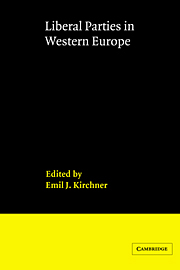Book contents
- Frontmatter
- Contents
- List of tables
- List of diagrams
- List of maps
- Notes on the contributors
- Preface
- 1 Introduction
- 2 Between left and right: the ambivalence of European liberalism
- 3 Two roads of Italian liberalism: the Partito Repubblicano Italiano (PRI) and the Partito Liberale Italiano (PLI)
- 4 The FDP in the Federal Republic of Germany: the requirements of survival and success
- 5 Great Britain — social liberalism reborn?
- 6 Liberalism in France
- 7 Liberal parties in the Netherlands
- 8 The Belgian liberal parties: economic radicals and social conservatives
- 9 The Freiheitliche Partei Österreichs: protest party or governing party?
- 10 The Swedish Liberal Party: The politics of unholy alliances
- 11 Liberalism in Denmark: agrarian, radical and still influential
- 12 The Norwegian Liberal Party: from political pioneer to political footnote
- 13 Liberal parties in Finland: from perennial coalition actors to an extra-parliamentary role
- 14 Liberal parties in Switzerland
- 15 The Luxemburg Liberal Party
- 16 Identifying liberal parties
- 17 Ambivalence revisited: an analysis of liberal party manifestos since 1945
- 18 Transnational links: the ELD and Liberal Party Group in the European Parliament
- 19 Western European liberal parties: developments since 1945 and prospects for the future
- Index of political parties
- General index
10 - The Swedish Liberal Party: The politics of unholy alliances
Published online by Cambridge University Press: 16 November 2009
- Frontmatter
- Contents
- List of tables
- List of diagrams
- List of maps
- Notes on the contributors
- Preface
- 1 Introduction
- 2 Between left and right: the ambivalence of European liberalism
- 3 Two roads of Italian liberalism: the Partito Repubblicano Italiano (PRI) and the Partito Liberale Italiano (PLI)
- 4 The FDP in the Federal Republic of Germany: the requirements of survival and success
- 5 Great Britain — social liberalism reborn?
- 6 Liberalism in France
- 7 Liberal parties in the Netherlands
- 8 The Belgian liberal parties: economic radicals and social conservatives
- 9 The Freiheitliche Partei Österreichs: protest party or governing party?
- 10 The Swedish Liberal Party: The politics of unholy alliances
- 11 Liberalism in Denmark: agrarian, radical and still influential
- 12 The Norwegian Liberal Party: from political pioneer to political footnote
- 13 Liberal parties in Finland: from perennial coalition actors to an extra-parliamentary role
- 14 Liberal parties in Switzerland
- 15 The Luxemburg Liberal Party
- 16 Identifying liberal parties
- 17 Ambivalence revisited: an analysis of liberal party manifestos since 1945
- 18 Transnational links: the ELD and Liberal Party Group in the European Parliament
- 19 Western European liberal parties: developments since 1945 and prospects for the future
- Index of political parties
- General index
Summary
introduction
Sweden is commonly looked upon as the middle-way Schlaraffenland, yet its citizens have not found the middle parties to their liking. Rather, the Liberal Party, (Folkpartiet) has often been made an object of ridicule by its opponents and in the media; television cannot resist the temptation to portray the party as an unholy alliance of atheist social science professors from Stockholm and pietist smallholders from the hinterland.
The Liberal Party's overall performance has not generally been applauded by the Swedish electorate. The party's reluctant stance on whether to join bourgeois coalition cabinets engendered much antipathy towards them among the public at large. The Liberal Party was seen as the champion of the ‘alternating-majority formula’ of governing, i.e. minority cabinets depending on either bourgeois or socialist support to pass legislation in parliament. Political tightrope walking is alien to the rationalist political culture of Sweden.
Time and again political commentators have prophesied the demise of the Liberal Party. Predictions of this kind have repeatedly turned out to be premature, most obviously in 1985 when the Liberal vote soared to 14.2 per cent from a previous all-time low of 5.9 per cent in 1982.
This chapter is meant to be an introduction to the nature and trends of Swedish liberal politics. The various topics raised in the course of the empirical analyses will be synthesised in a concluding discussion on whether Sweden is an illiberal society or, on the contrary, too liberal to be in need of a liberal party, or if the Liberal Party (until very recently) has misconceived its mission in Swedish politics.
- Type
- Chapter
- Information
- Liberal Parties in Western Europe , pp. 252 - 278Publisher: Cambridge University PressPrint publication year: 1988



